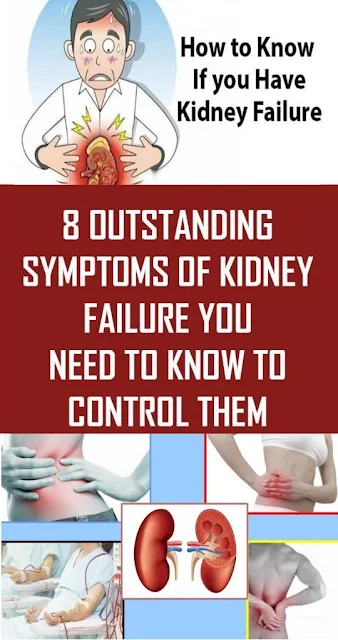Acute kidney failure can happen to anyone and it’s a fairly common but dangerous condition. It happens as a result of poor blood filtering which can cause the kidneys to stop performing their filtering function properly and waste material to start accumulating in the body, leading to fatal consequences. The kidneys have about 2 million nephrons which filter 4 liters a blood every 5 minute, every hour, every day, non-stop. This should tell you how important their role is in the human body and how important it is that they perform their blood filtering and mineral balancing function properly.
If you have acute kidney failure you need to react immediately and repair the damage that has already be done and prevent further complications. Here are 8 of the most common symptoms of acute renal failure you need to watch out for and if you notice some of them see a doctor immediately.
The most common symptoms of acute renal failure
Inflammation and/or swelling
Swelling or inflammation is the first thing you’ll notice if you have this disease. It’s the first and most common symptom that alerts you your kidneys aren’t functioning properly. This means that they’re not purifying your blood so there’s an accumulation of waste in your body which in turn leads fluid retention and swelling. The first ones to cave in under the pressure are your legs and feet, so if they’re often swollen you might have acute renal failure.
Urination pattern changes
You can easily detect if your kidneys are functioning properly or not by the color of your urine and any problems you might be having while urinating. If you notice any of the following changes in your urination pattern you need to see a doctor right away:
- Problems while urinating
- Pale or dark colored urine
- Feels like you need to make an extra effort to urinate
- Foamy urine
- Frequent bathroom visits during the night
- Unusually small amount of urine
Rashes
If waste is being accumulated in your body you will notice the signs on your skin. You’ll feel an itching sensation, you’ll break up in rashes, your skin quality will deteriorate and you’ll just know that something is wrong. Any of these symptoms could indicate acute renal failure so you should contact a doctor and see if that’s what’s causing it.
Chronic tiredness
The kidneys secrete EPO or Erythropoietin, which is a hormone that controls the red blood cells production. If the kidneys stop working to their full capacity it affects the secretion of this hormone which makes you feel tired and low on energy. If you frequently feel tired throughout the day and your urine is with an unusual color or smell visit your doctor and check for renal failure.
Metallic taste
If your kidneys start failing and the waste material starts accumulating in your body your sense of taste is affected. Most commonly, people with kidney problems complain of a metallic sense in their mouth so if this is the case with you as well you need to see your doctor.
Shortness of breath
As we already mentioned, your kidneys secrete a hormone that controls the production of red blood cells. If and when the kidneys start failing the production of red blood cells is affected and if their count is lower than usual the oxygen levels in your cells and tissues is affected as well. Hence, you feel a shortness of breath.
Lower back pain
The kidneys are located in your back so if you suffer from acute renal failure the pain is commonly manifested in the lower back region. If you frequently have this type of pain see your doctor.
Nausea, dizziness and problems concentrating
Lower red blood cells count can lead to difficulties concentrating, while kidney failure can limit the blood supply to the brain leading to dizziness. People who have kidney problems usually complain that they frequently feel lightheaded, dizzy, nauseous and having memory problems.
The problem with acute renal failure is that its symptoms can easily get mixed up with some other disease, the symptoms can go unnoticed for a longer period of time or the condition can easily get misdiagnosed because the symptoms can be attributed to many other diseases as well. If you suspect of kidney problems you need to ask your doctor to perform urine and blood tests to confirm for sure.
You can also ask for abdominal ultrasound or sometimes even renal biopsy can be performed so that the doctors can determine the cause of the renal failure. As with any other disease, the faster it’s diagnosed and you start treatment the better your chances of a full recovery. In many cases the disease can lead to permanent loss of renal function and if this is the case the person will have to go to life-long dialysis or may even need a kidney transplant.
There are some factors which may increase the risk of this disease such as some chronic infection, age, diabetes, hepatic and renal base problems, hypertension, immune system disorders, bladder obstructions or hypertrophy, so if you have any of these conditions you need to be extra careful. The function of your kidneys is vital for the proper functioning of your entire body so you need to pay close attention and monitor for any of the abovementioned symptoms. Early detection is your best chance to treat it successfully and restore your kidneys’ function back to normal.
